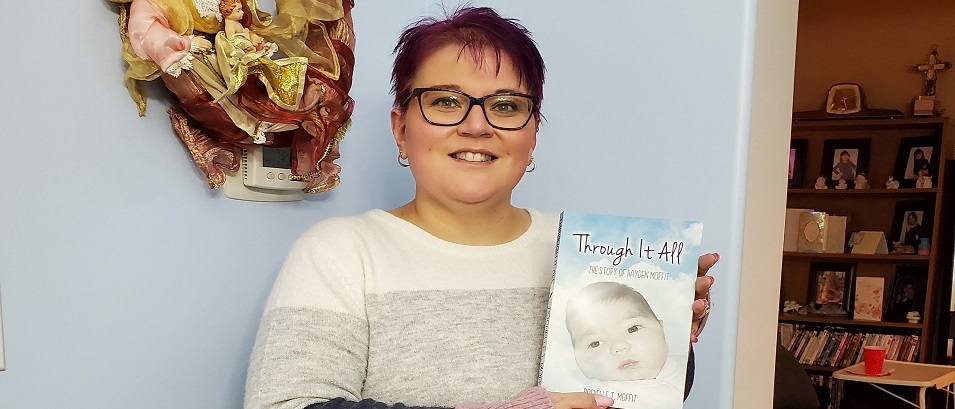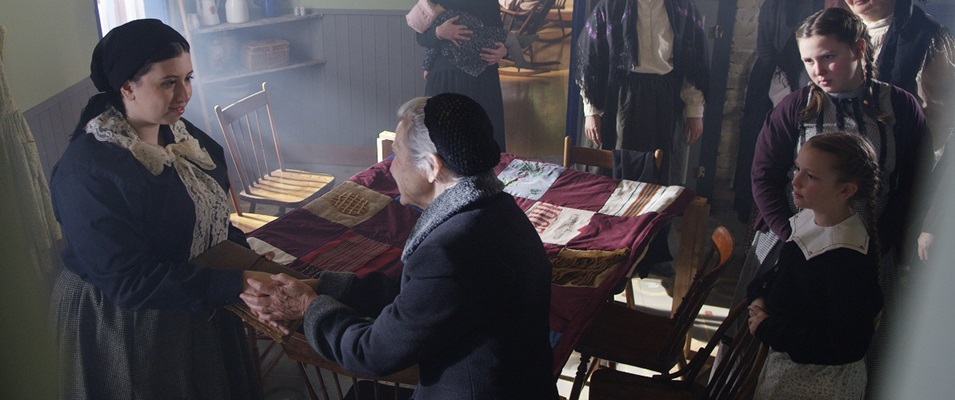
A Niverville woman has a new book out this holiday season. Rochelle T. Moffit’s Through It All tells the autobiographical story of how she lost a child but managed to live through the grief and pain and come out the other side with her life, marriage, and joyful spirit somehow still intact.
Moffit says that she had a good start to life and grew up in a happy family. As she grew older, though, she began dating and fell into an abusive relationship.
In that relationship, she felt that she needed to devote all of herself to her boyfriend or she would lose him. In the process she pushed aside her faith, her family, and her friends.
Eventually she became pregnant, but her abuser punched her hard enough to cause a miscarriage.
She was so deep into this abusive relationship that she wasn’t able to leave, even after this tragedy.
Later in the relationship she attempted to get pregnant again—unsuccessfully. She was left devastated, believing that her first miscarriage had caused irreparable damage.
“Later I realized that not getting pregnant was actually God saving me from a life I would regret,” Moffitt says.
In the book, Moffit shares many other stories of God’s grace over her life, but the main story begins when she got pregnant for the fourth time. By that point, Moffit had married a man named William and together they had two daughters. Life was good.
But on the day of her daughter’s second birthday, Moffit fell down a flight of stairs. She was four months pregnant.
The next day, Moffit began to bleed profusely and rushed to the emergency room. The doctor, she says, was very cold about her circumstances. He told her, “You’re having a miscarriage. Just get on with life.”
That’s when a kind nurse stepped in and determined that Moffit may not have been miscarrying. The nurse advised Moffit to get an emergency ultrasound.
Through that ultrasound, she found out that she was not miscarrying but rather had suffered a placental abruption. An abruption is when the placenta begins to pull away from the uterine wall.
She was put on strict bedrest and she and her family simply had to wait to see whether her body would heal itself.
Moffit made it through that pregnancy and had a boy she named Hayden, although he was born critically ill with his umbilical cord wrapped very tightly two times around his neck. He had profound cerebral palsy, no gag reflex, no ability to blink, and couldn’t breathe on his own. His muscles were rigid.
“We were told Hayden would never leave the hospital,” Moffit says. “Never breathe on his own. Never open his eyes or utter a sound. But [he went on to do] all this and so much more.”
Nonetheless, Hayden succumbed to his disease at the age of two.
Moffit believes that her book tells two great truths. The first, she says, “is that God never leaves us—even when we have walked away… The second truth is that we don’t have to wait till we are in heaven to obtain God’s fullness of joy. We just need to learn to change our way of thinking and see our everyday [life] as being blessed.”
That being said, Moffit makes it clear that she doesn’t believe Christians can’t be depressed or shouldn’t grieve.
“There seems to be a lot of judgement cast on Christians if they suffer from mental health issues or grieve too long,” she says. “Some have said that if you have either of these conditions, so to speak, that you have lost your faith. Nothing could be farther than the truth. We all live in this very fallen world, and we are all still a work in progress.”
Moffitt believes that while everyone could benefit from reading this book, she wrote it specifically to help parents who have a sick child or who have lost a child. She feels that her openness and candidness will help people get through the very worst of times.
Knowing everything she knows now, she says she still wouldn’t go back and change anything about Hayden’s life or her time with him.
“Hayden was born the way he was born for reasons only God knows,” she says. “But so many lives were changed for the better.”
Ultimately, Moffit says, the book is about the reality of the life she’s lived.
“I feel people don’t need fake; they need real. They need to see that it is okay to be broken and hurt, but that God wants us to move past the hurt to joy.”



















